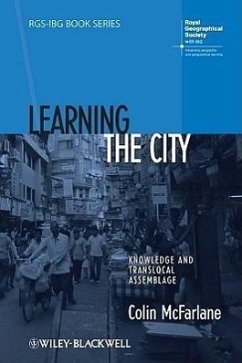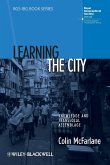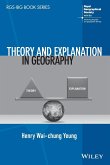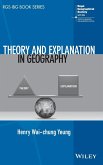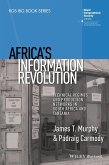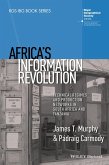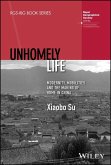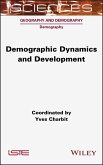Learning the City critically examines the relationship between knowledge, learning, and urbanism. It argues both for the centrality of learning for political strategies and for a resurgence of learning that represents a critical opportunity to develop a progressive international urbanism. The author combines the result of his fieldwork conducted in Mumbai and other regions with a synthesis of the most current theoretical research on knowledge, space, and materiality to show how learning should be viewed as central to the production and politics of cities. In doing so, he deploys the analytic of assemblage to explain the complex processes through which knowledge and learning enable and limit various forms of urbanism. This groundbreaking work examines learning as a practice, explores learning as tactics, and reveals how learning is intrinsic to the shape of political imaginaries, strategies, and contestations. A critical discussion of the types of learning environments that may facilitate more socially just urbanisms is also included. Provocative, timely, and fraught with scholarly rigor, Learning the City offers invaluable insights into the role of learning in urban developmental studies.
Hinweis: Dieser Artikel kann nur an eine deutsche Lieferadresse ausgeliefert werden.
Hinweis: Dieser Artikel kann nur an eine deutsche Lieferadresse ausgeliefert werden.
"Learning the City makes an exhaustive case for framingour studies of knowledge and power through the optic of thelearning assemblage. Its revelatory power is arguably profound forMcFarlane, it promises nothing short of understanding the power toforge a different kind of city." (Antipode, 1September 2013)
"This book is a significant step in bringing learning tothe core of urban study... This volume's detailedfieldwork effectively supports its desire to see learning occupy acentral place in the production of more socially justurbanisms." (Area, 1 May 2013)
"Learning the Cityis a critical academic contributionuseful for scholars of the field. found it particularlyuseful for my research on policy circulation of Bus Rapid Transitconcepts through the South African city . . . While Learning theCityis probably too sophisticated for younger readers, it is sureto become indispensable for academics of thediscipline." (Geography Helvitica, 1 December 2012)"Through Learning the City McFarlane has made a majorcontribution to our understandings of the urban. In its commitmentto the diverse and lively practices through which the city islearned and known, in its engagement with the diverse forms ofagency and political practices through which agency is assembledand re-assembled the book enlivens understandings of spatialpolitics. It is also a text that is animated by a powerful sense ofhope that cities might come to bere-assembled in different waysthat are more equitable and more open to different agentic forcesand contributions." (Society and Space, 1 November 2012)
"There will certainly be a range of contributors that join in onthe exciting task of making these links. In Learning theCity, McFarlane successfully manages to open the black box ofurban learning in widening the perspective to acknowledge diverseurban learning practices, which may even bear a transformativepotential in certain contexts." (International PlanningStudies, 23 October 2012)
"Urbanism, McFarlane believes, needs a theory of learning;throughout his book he builds a very sophisticated one...[he]brings us closer to the material stuff of urban life andpolitics...a kind of urbanism in motion, whereby what we cometo term 'knowledge', 'infrastructure' and'resources' are never simply 'there', butmust be translated, distributed, coordinated, perceived andinhabited". (International Journal of Urban and RegionalResearch, Volume 38.1, January 2014)."Innovative in its approach and rigorous in its coverage, this bookis an important contribution to the field of urban studies andhuman geography. It challenges the standard format of the researchmonograph and introduces new vectors of knowledge and debate to thestudy of cities. In a world where the usual North-South dichotomiesare being disturbed, McFarlane's emphasis on a postcolonialapproach to practices of learning is a valuable framework."
--Ananya Roy, University of California
"McFarlane's work stands out in that it tells us how residentsfrom various walks of life actually learn to operate inheterogeneous and often volatile urban environments. Insteadof assuming that urban dwellers walk around with preconceived mapsin their heads, this book provides a comprehensive account of thevarious practices, mobilizations and tools they use over time sothat the city becomes a staging area for new capacities andpotentials."
--AbdouMaliq Simone, Goldsmith College, University ofLondon
"This book is a significant step in bringing learning tothe core of urban study... This volume's detailedfieldwork effectively supports its desire to see learning occupy acentral place in the production of more socially justurbanisms." (Area, 1 May 2013)
"Learning the Cityis a critical academic contributionuseful for scholars of the field. found it particularlyuseful for my research on policy circulation of Bus Rapid Transitconcepts through the South African city . . . While Learning theCityis probably too sophisticated for younger readers, it is sureto become indispensable for academics of thediscipline." (Geography Helvitica, 1 December 2012)"Through Learning the City McFarlane has made a majorcontribution to our understandings of the urban. In its commitmentto the diverse and lively practices through which the city islearned and known, in its engagement with the diverse forms ofagency and political practices through which agency is assembledand re-assembled the book enlivens understandings of spatialpolitics. It is also a text that is animated by a powerful sense ofhope that cities might come to bere-assembled in different waysthat are more equitable and more open to different agentic forcesand contributions." (Society and Space, 1 November 2012)
"There will certainly be a range of contributors that join in onthe exciting task of making these links. In Learning theCity, McFarlane successfully manages to open the black box ofurban learning in widening the perspective to acknowledge diverseurban learning practices, which may even bear a transformativepotential in certain contexts." (International PlanningStudies, 23 October 2012)
"Urbanism, McFarlane believes, needs a theory of learning;throughout his book he builds a very sophisticated one...[he]brings us closer to the material stuff of urban life andpolitics...a kind of urbanism in motion, whereby what we cometo term 'knowledge', 'infrastructure' and'resources' are never simply 'there', butmust be translated, distributed, coordinated, perceived andinhabited". (International Journal of Urban and RegionalResearch, Volume 38.1, January 2014)."Innovative in its approach and rigorous in its coverage, this bookis an important contribution to the field of urban studies andhuman geography. It challenges the standard format of the researchmonograph and introduces new vectors of knowledge and debate to thestudy of cities. In a world where the usual North-South dichotomiesare being disturbed, McFarlane's emphasis on a postcolonialapproach to practices of learning is a valuable framework."
--Ananya Roy, University of California
"McFarlane's work stands out in that it tells us how residentsfrom various walks of life actually learn to operate inheterogeneous and often volatile urban environments. Insteadof assuming that urban dwellers walk around with preconceived mapsin their heads, this book provides a comprehensive account of thevarious practices, mobilizations and tools they use over time sothat the city becomes a staging area for new capacities andpotentials."
--AbdouMaliq Simone, Goldsmith College, University ofLondon

